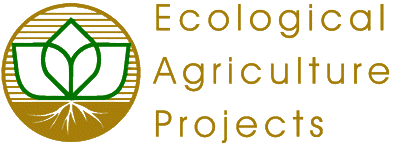

EAP Publications | Virtual Library | Magazine Rack | Search
Join the Ecological Solutions RoundtableEAP Publication - 61
In a well managed garden, pesticides are rarely necessary. Well nourished plants are relatively resistant to insect and disease attack, and beneficial organisms keep most pests in check. Many gardeners use pesticides unnecessarily at the first sight of an insect in their garden, even without knowing if the insect is a pest. In fact, only 0.1% of insects are pests, 99.9% being beneficial or neutral with respect to humans. Pesticides cannot distinguish between these two types. One problem is that when we kill a beneficial species, we inherit its job; another is that because our knowledge of the beneficial species and the jobs they do is only partial, it is impossible to fully act on this responsibility. Consequently, when possible, it is best to avoid pests by designing and managing the garden to prevent such problems from arising. Safe materials, such as those mentioned below, should be used only as a last resort.
Bt is a safe, effective insecticide, useful for many garden pest problems such as cabbage worms, cutworms, tomato hornworm, tent caterpillars, gypsy moth, and many more. It infects and kills all species of caterpillars and must be eaten by the latter to be effective. Strains have now been isolated that can be used against potato beetles, mosquito and blackfly larvae and some other insects.
Bt can be purchased in Quebec as DipelR,ThuricideR and EnvirobacR and is often marketed in garden centres as "organic garden spray". It is formulated in both a liquid and powder form, and should be applied directly on the plant, or on the soil in the case of cutworms. It is relatively quickly destroyed by sunlight, so apply at the end of the day, and cover the undersides of leaves as much as possible. Additional applications should be made after heavy rains.
Source: Most garden centres, Botanix
Diatomaceous earth is another relatively safe pesticide. It comprises the crushed skeletons of tiny, one-celled plants, and is effective against many insects such as cockroaches, earwigs, ants and silverfish. It acts by removing the waxy coating that normally prevents the insect from losing water; the insect then dies from dehydration. Its non-selectivity is a disadvantage, in a way, as it will kill beneficial insects as well as pests. This pesticide should therefore be used primarily in buildings where no insects are tolerated. Fortunately, because of their hairiness, most bees are not affected by Diatomaceous earth.
In Quebec, Diatomaceous earth is manufactured by Chemfree Environment and is sold under the brand name of `Insectigone',which is available from many garden centres, Pascal and Ecological Agriculture Projects.
In Ontario and some parts of Canada, a common brand name is `Fossil Flower', which is widely available in garden centres and hardware stores. However, most of this company's formulations contain synthetic pesticides and should not be used by organic gardeners.
Certain soaps have been selected for their insecticidal properties, and are quite effective against aphids, mealybugs, spider mites, scales, loopers, ants and fleas. The soaps are not harmful to lady beetles or parasitic wasps of aphids, and affect honey bees only minimally. If not ingested, the soaps are not toxic to humans or pets. They are marketed in Quebec by Safer's and Fossil Flower.
Alternatively, soap solutions can be made by mixing a heaped tablespoon of soap flakes or powder (not detergent) in two liters of hot water and allow it to cool before spraying. To avoid any damage to the plants, wash the soap off after three or four hours.
Source: Most garden centres, W.H. Perron, Richter's Catalogue Botanix
Rotenone and pyrethrum are two effective, broad spectrum insecticides that are relatively safe to use. Both are extracted from plants, although synthetic pyrethroids are now on the market. These chemicals are rapidly broken down by light, heat and contact with air.
Pyrethrum has quite a low toxicity to mammals; rotenone is somewhat more toxic but both are used in very small quantities in the commercial products making them fairly safe to handle. Gardeners should also consider that the chemical groups of these two pesticides are not known to be carcinogenic as are organophosphates and carbamates, two groups to which many synthetic pesticides belong. Rotenone and pyrethrum are very toxic to cold-blooded animals, including fish, so they should not be allowed to contaminate waterways. Rotenone is also very toxic to pigs.


Copyright © 1988 Ecological Agriculture Projects
Info Request | Services | Become EAP Member | Site Map
Give us your comments about the EAP site
Ecological Agriculture Projects, McGill University (Macdonald
Campus)
Ste-Anne-de-Bellevue, QC, H9X 3V9 Canada
Telephone:
(514)-398-7771
Fax:
(514)-398-7621
Email: eapinfo@macdonald.mcgill.ca
To report problems or otherwise comment on the structure of this site, send mail to the Webmaster